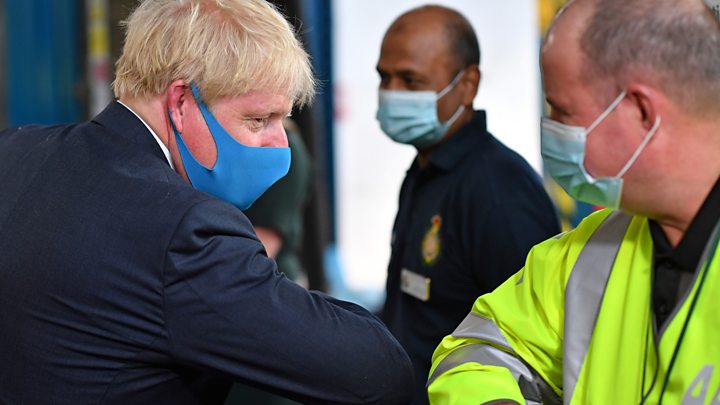
Media playback is unsupported on your device
Boris Johnson has said people in England "should be wearing" face masks or other coverings inside shops to help prevent the spread of coronavirus.
The prime minister said the government would decide in the next few days if "tools of enforcement" were needed.
The comments follow cabinet minister Michael Gove telling the BBC on Sunday that face coverings should not become mandatory in shops in England.
Labour accused the government of having "a lack of clarity" on the issue.
Currently, face coverings are compulsory on public transport in England, Scotland and Northern Ireland - and the Welsh government has announced it will enforce the same measure from 27 July.
In Scotland, coverings are also mandatory in shops, but critics have complained that the situation in England needs to be made easier for the public to understand.
Visiting ambulance staff in central London, Mr Johnson, whose government controls health policy in England but not the rest of the UK, said: "I think people should be wearing [face masks] in shops.
"And, in terms of how we do that whether we make it mandatory or not, we'll be looking at the guidance - we'll be seeing a little bit more in the next few days."
Mr Johnson added: "Throughout this crisis people have shown amazing sensitivity towards other people and understanding of the needs to get the virus down by doing things cooperatively.
"Wearing masks is one of them... It's a mutual thing; people do see the value of it. We'll be looking in the next few days about exactly how - with what tools of enforcement - we think we want to make progress."
Analysis by Helen Catt, political correspondent
The signs seem to point towards the government making face masks compulsory in more places in England, but ministers appear reluctant to commit just yet.
Michael Gove's preference for trying to encourage people to take action voluntarily - rather than through fear of enforcement - is one we've seen the government repeat throughout the pandemic.
But the risk that comes with it is of mixed messaging. Earlier, when coronavirus was more widespread, it said the scientific evidence for mask-wearing was not clear enough. Now, it says, the evidence is stronger.
Of course, the scientific understanding of the virus is constantly developing, and so policy is likely to as well.
If the government does now think masks are the way forward though, communicating that message without confusion is going to be key.
Face coverings are worn to help prevent wearers spreading coronavirus, rather than catching it.
The prime minister said on Friday: "I do think we need to be stricter in insisting people wear face coverings in confined spaces where they are meeting people they don't normally meet."
But on Sunday, Cabinet Office minister Mr Gove told the BBC's Andrew Marr Show he did not think wearing masks in shops in England should be compulsory, adding that he would "encourage" them to do so "where they are likely to be mixing with others and where the ventilation may not be as good as it might".
He added: "I think that it is basic good manners, courtesy and consideration, to wear a face mask if you are, for example, in a shop."
Asked on BBC Radio 4's Today programme on Monday whether he was in the "mandatory perhaps" or "mandatory never" camp, Justice Secretary Robert Buckland said: "I think I'm 'mandatory perhaps'.
"Wearing them in an enclosed space where you've got lots of people, for example a busy shop, seems to be sensible."
Speaking on BBC One's Breakfast Mr Buckland said Mr Gove had not been "saying that people should not wear masks or take any mitigating actions at all. It's clearly the case that wearing a mask is an act of altruism.
"It doesn't actually protect you from the disease, but it prevents inadvertent transmission by the wearer to somebody else."
He said he wore them himself when visiting small shops, and it was "very sensible" to do so in supermarkets at busy times.
Labour's shadow business minister Lucy Powell told the BBC News Channel: "We need clarity of message, so that people understand what's expected of them. When that's going to happen?"
She also asked whether the prime minister was "talking about a legal obligation" or "a culture change".

 5 years ago
583
5 years ago
583 

